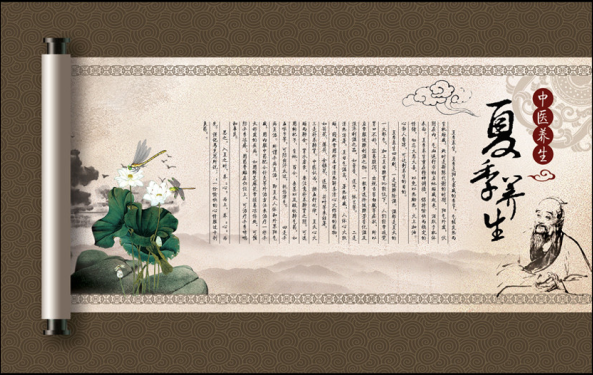The therapeutic principles are formulated according to the basic theory of TCM and syndrome differentiation. These principles should be followed throughout the process of designing therapeutic methods, selecting prescriptions, and administering drugs.
1. Routine treatment and treatment contrary to the routine
Routine treatment refers to a therapeutic principle of treating a disease with the method and drugs contrary to its nature, i. e., treating heat syndrome with drugs of cold nature, treating cold syndrome with drugs of warm or hot nature, treating deficiency syndrome with replenishing method, and treating excess syndrome with reducing method.
Treatment contrary to the routine refers to a therapeutic principle applied for a specific condition, in which there exist false phenomena against the essential nature of disease. In this case a treatment aiming at the false phenomena is given, i.e., treating the false cold phenomena (in a real heat syndrome) with drugs of cold nature, treating the false heat phenomena (in a real cold syndrome) with drugs of warm or hot nature, treating the false phenomena of stagnation (in a real deficiency syndrome) with replenishing method, and treating diarrhea (in a real excessive heat syndrome) with purging method.
These treatments seemingly aim at the false phenomena, e.g., cold method for cold manifestations, and warming method for heat manifestations, but they are directly against the essential pathogenesis of a disease. Clinically Baihu Tang (White Tiger Decoction), which is indicated for excessive heat in yangming meridian or excessive heat in qifen in a febrile disease, is used to treat the patient with false cold phenomena in an excessive heat syndrome; and various Purgative Decoctions are used to treat the patient with false phenomena such as diarrhea and delirium with accumulated heat in the large intestine.

2. Strengthening anti-pathogenic qi and eliminating pathogenic factors
Strengthening anti-pathogenic qi is a therapeutic principle of using replenishing methods for deficiency syndromes; eliminating pathogenic factors is a therapeutic principle of using reducing or removing methods for excess syndromes. The development of a disease is the conflict between the anti-pathogenic qi and pathogenic factors. The disease progresses when pathogenic factors overcome the anti-pathogenic qi, and it subsides when anti-pathogenic qi defeats the pathogenic factors. The treatment of strengthening anti-pathogenic qi and eliminating pathogenic factors will restore the anti-pathogenic qi to resist pathogenic factors, which is conducive to the recovery of diseases.
The methods for strengthening anti-pathogenic qi include replenishing qi, nourishing blood, nourishing yin and invigorating yang. The methods for eliminating pathogenic factors include dispelling superficial pathogens, purgation, eliminating dampness, promoting diuresis, promoting digestion, and resolving blood stasis. Being mutually supportive, strengthening anti-pathogenic qi will facilitate resisting pathogenic factors, while eliminating pathogenic factors from the body will help protect and restore anti-pathogenic qi.
Generally methods for strengthening anti-pathogenic qi are used for deficiency syndromes with indistinct pathogenic factors, while methods for eliminating pathogenic factors are used for excess syndromes with indistinct deficiency of anti-pathogenic qi. A complicated syndrome with anti-pathogenic qi deficiency and pathogenic factors accumulation will require a method of both strengthening ant pathogenic qi and eliminating pathogenic factors.
In clinical practice it is necessary to differentiate which is dominant, excess or deficiency, in a complicated syndrome. When deficiency is dominant, serious and acute, the complicated syndrome should be treated with replenishing methods supplemented with a mild eliminating method; while a treatment for eliminating pathogenic factors will be adopted together with a mild replenishing method if the acute and serious excess is the major problem in a complicated syndrome.
In a deficiency syndrome complicated with excess, when predominant deficiency does not permit an eliminating treatment, or the eliminating treatment may further damage anti-pathogenic qi, then the eliminating method should be applied only after the ant Pathogenic qi is restored. Likewise, in an excess syndrome complicated with mild deficiency or evident deficiency, the replenishing method may foster the pathogenic factors. In that case replenishing method should be used after the Pathogenic factors are eliminated. In short, it is important to avoid the retention of pathogenic factors when the method of strengthening anti-pathogenic qi is applied, and not to damage the anti-pathogenic qi when the method for eliminating pathogenic factors is used.
3. Replenishing and eliminating methods for zang-fu organs
As previously discussed, TCM holistic view postulates that the human body is an organic whole, and that zang-fu organs are interrelated physiologically and are affected one another pathologically. Disease of a given organ will affect other organs; and, in turn, disorder of an affected organ may affect the original organ. The replenishing and eliminating methods are given according to the principles defined by the five-element theory among zang- fu organs, e.g.'', inter-generation, inter-restriction, and exterior-interior relation.
The principles include replenishing the mother-organ for deficiency syndrome and reducing the child-organ for excess syndrome; replenishing water to inhibit pathogenic yang and invigorating fire to eliminate pathogenic yin; and treating the exterior fu-organ to relieve the problem in corresponding interior zang-organ or treating the interior zang-organ to relieve the problem in corresponding exterior fu-organ.
4. Different principles for different cases
This means that the principles of treatment should vary with individual cases, climatic conditions, environmental factors, etc.







